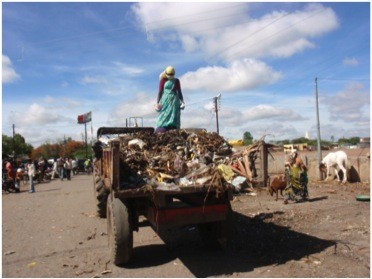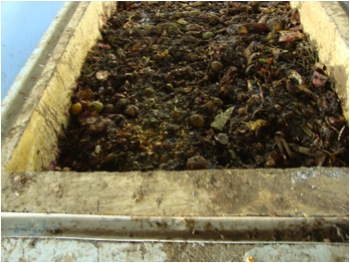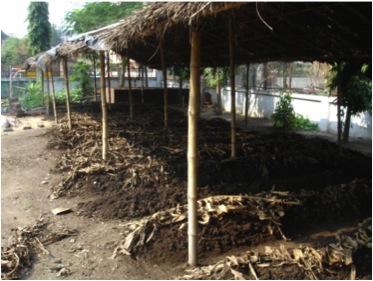SOCAP11: Waste Management that Works
Editor’s note: The following is one of several previews posts leading up to September’s SOCAP 11 Conference on Sept. 6-9 in San Francisco. (All images courtesy of Waste Ventures).
Parag Gupta, founder and CEO of Waste Ventures recently told me that urban India produces a mound of garbage that weighs twice as much as the Empire State Building every week.
In that big pile of trash, Gupta and his team identified a glowing opportunity for economic, social, and environmental impact.
Waste Ventures works with municipalities and civil society to create waste picker-run municipal waste management systems. The newly formed waste management organizations to operate fee-for-service collection, recycling, composting, and biogas creation services.
And here is why it matters: This model is four-times as profitable as the status quo, triples waste picker salaries (currently around USD$2/day), averts 70 percent of waste from dumpsites, and reduces greenhouse gases. Earlier this summer, Waste Ventures created India’s first waste picker managed integrated municipal waste system reaching 130,000 people.
 It’s neither a simple model nor an easy process to facilitate – that’s one of the reasons why no one has cracked this nut just yet. But with the unrelenting energy of a solid management team, a deep understanding of local markets, and over 700,000 citizens and 300 employees already benefiting Waste Ventures work, the organization has scalability firmly in its sights. Without further ado, here’s what Parag had to say when we sat down to discuss the model and what makes it tick.
It’s neither a simple model nor an easy process to facilitate – that’s one of the reasons why no one has cracked this nut just yet. But with the unrelenting energy of a solid management team, a deep understanding of local markets, and over 700,000 citizens and 300 employees already benefiting Waste Ventures work, the organization has scalability firmly in its sights. Without further ado, here’s what Parag had to say when we sat down to discuss the model and what makes it tick.
NextBillion.net: Anyone who has been to India might ask why there isn’t a more efficient way to deal with waste. Waste Ventures might just have an answer. What is the secret in the sauce?
Gupta: The key to making it work lies more in implementation and operations than in any single innovation. Rather than reinvent the wheel, we operationalize a better mouse trap that is commercially viable and yields social impact. In short, we adapt low-tech, low-cost, highly retail-able solutions to waste management that achieve superior profit margins.
When operating at scale to collect waste, compost, and recycle, our waste management companies can produce profit margins around 30 percent.
We help them get there by operating at a nexus of municipality, civil society and commercial markets. Waste Ventures Charities, the affiliated non-profit, assists municipalities in the creation of environmentally compliant waste management tenders. It also helps the local waste pickers to adopt a cooperative structure, attain the municipal contract, and then financially and technically manage the waste management operations. Waste Capital Partners, the for-profit affiliate, finances the operations and infrastructure (hand carts, compost shed, recycling machinery, and so on) while also helping the groups monetize carbon credits.
NextBillion.net: Tell our readers where the model is operating currently and at what capacity.
 Gupta: In Bokaro Steel City, Jharkhand in eastern India, we assisted a waste picker group in creating a compost site that now processes 30 tons of compostable waste per month. Prior to Waste Ventures involvement, the group was able to collect 40 percent of the city’s waste. After we introduced and supported the development of a composting program, they increased collection to 100 percent of the city of 600,000 residents. The process employs more than 140 local waste pickers.
Gupta: In Bokaro Steel City, Jharkhand in eastern India, we assisted a waste picker group in creating a compost site that now processes 30 tons of compostable waste per month. Prior to Waste Ventures involvement, the group was able to collect 40 percent of the city’s waste. After we introduced and supported the development of a composting program, they increased collection to 100 percent of the city of 600,000 residents. The process employs more than 140 local waste pickers.
In Osmanabad, Maharastra we launched our first fully integrated municipal waste management system managed by waste pickers. The group of 100 waste pickers now manages a municipal contract for door-to-door collection and recycling, covering 100 percent of the city or about 130,000 people.
We’re in the process of assessing the readiness of 25 additional municipalities in India where we’d like to build partnerships next. We’re also currently wrapping up some feasibility assessments in Latin America.
NextBillion.net: Constructing durable partnerships appears to be central to your model. Give us some insight into what principles you’ve learned that make them stick.
Gupta: In order to be successful we ensure that the commercial market, municipality, and civil society organizations all align to support our mission before entering a particular locale.
First, we evaluate the commercial market in a given area. We determine whether the local market can support a Waste Ventures entity by examining the markets for compost, the current waste collection system, and the local recycling value chain. These factors lead us to focus on cities of 100,000 – 500,000 that tend to be closer to farmland and compost buyers. When we have identified a promising area, we locate a progressive, willing municipal partner, preferably one interested in increasing social impact and wages for waste pickers in a transparent manner. Next, we seek out a civil society organization of waste pickers capable of undergoing the transformation to become a well-managed waste picker company.
NextBillion.net: Help paint the future vision for our readers. When Waste Ventures builds more of these strong partnerships and scales the model, what’s in it for society?
 Gupta: In Osmanabad, the average waste picker salary was 70 rupees per day collecting recycling from dump sites (about $1.50). The Waste Ventures-supported waste management organization triples that. The waste management companies established by the Waste Ventures provide 150 rupees a day in wages for waste collection while still allowing the waste pickers to keep and sell the recyclables collected. And by collecting recyclables directly instead of picking through a landfill, employees collect higher quality recyclables increasing their recycling revenue. Waste Ventures wages – already 3x the waste picker’s former wagers- don’t even include dividends from carbon monetization, recycling plant profits, or compost sales which will go towards social programs like health insurance and childcare/ education.
Gupta: In Osmanabad, the average waste picker salary was 70 rupees per day collecting recycling from dump sites (about $1.50). The Waste Ventures-supported waste management organization triples that. The waste management companies established by the Waste Ventures provide 150 rupees a day in wages for waste collection while still allowing the waste pickers to keep and sell the recyclables collected. And by collecting recyclables directly instead of picking through a landfill, employees collect higher quality recyclables increasing their recycling revenue. Waste Ventures wages – already 3x the waste picker’s former wagers- don’t even include dividends from carbon monetization, recycling plant profits, or compost sales which will go towards social programs like health insurance and childcare/ education.
In the bigger picture, we’re trying to build the foundation of a thriving commercial sector so that in 15 years, there won’t be a need to have Waste Ventures Charities. Everyone will know how to build a profitable waste management organization in developing countries. We will have proven the model and mitigated the risk so that commercial investors will not have nearly the same level of risk to worry about.
We are working towards alleviating poverty for 15 million people while reducing 1.5 percent of greenhouse gas globally. If we can get the system to commercial viability it will make no sense to put compostable or recyclable waste in a landfill.
NextBillion.net: What’s the biggest challenge to getting there? Tell us about the most pressing issue that keeps you up at night.
Gupta: We want to drastically accelerate expansion in this sector. The number one issue is building the organizational capacity within the picker organizations. Few organizations have been able to run commercially viable companies in this space – most are nonprofits. Our core focus is on making commercially viable businesses. It’s our biggest challenge and our biggest opportunity.
To learn more about Waste Ventures’ model and approach, join Parag Gupta at SOCAP 11 at 1:45 p.m. Sept. 8 in San Francisco for a panel titled Synergies Across Silos: Managing Mission, Meaning and Multiple Stakeholders. You can also keep up with his teams’ latest thinking on Social Edge in the blog “Talking Trash.” And if you’re feeling particularly inspired, head to the organization’s webpage this week to give them a boost via Global Giving – your donation will be matched by a generous funder.
Please like NextBillion on Facebook, follow us on Twitter and/or join our LinkedIn group.
- Categories
- Environment, Health Care
